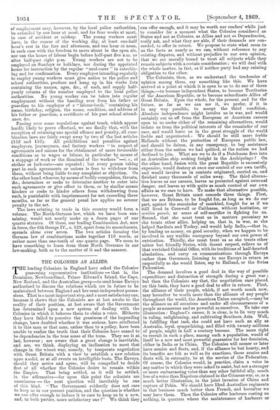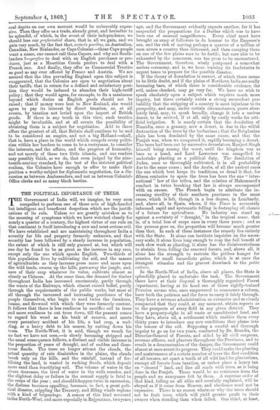THE COLONIES AS ALLIES.
THE leading Colonists in England have asked the Colonies possessing representative institutions — that is, the Dominion, Newfoundland, Prince Edward's Island, the Cape, New Zealand, and the Australian group—to send home Envoys authorized to discuss the relations which are in future to be maintained between England and her semi-independent posses- sions. That is a most important step, and a most satisfactory one, because it shows that the Colonists are at last awake to the reality of their position, at last aware that the Government has determined upon a new system of dealing with the Colonies in which it behoves them to claim a voice. Hitherto they have failed to perceive the greatness of the impending change, have doubted whether it was serious, have attributed it to this man or that man, rather than to a policy, have been unable to realize the truth that their Colonies have ceased to be dependencies in the true sense of the term. They see it at last, however ; are aware that a great change is inevitable, and are, we think, displaying an inclination to meet that change in the wisest way, namely, by temperate negotiation with Great Britain with a view to establish a new relation upon a solid, or at all events an intelligible basis. The Envoys, should they arrive and agree, will be compelled to decide first of all whether the Colonies desire to remain within the Empire. That being settled, as it will be settled, in the affirmative—for upon this point the colonists are unanimous — the next question will inevitably be one of this kind. "The Government evidently does not care to keep us in our present position, and the question is whether we can offer enough to induce it to care to keep us in a new, and, to both parties, more satisfactory one I" We think they
can offer enough, and it may be worth our readers' while just to consider for a moment what the Colonies considered as States and not as Colonies, as Allies and not as Dependencies, really ask, and what they are able, if their demands are con- ceeded, to offer in return. We propose to state what seem.to- us the facts as nearly as we can, without reference to any existing disputes, and without prejudice to our own opinion, that we are morally bound to treat all subjects while they remain subjects with a certain consideration ; we will deal with the whole matter, in fact, as if neither party had any existing obligation to the other.
The Colonists, then, as we understand the tendencies of opinion among them, say something like this. We have arrived at a point at which it is open to us to do one of three things,—to become independent States, to become Territories. ofthe American Republic, or to become subordinate Allies of Great Britain. Upon the whole, for the present and for the future, as far as we can see it, we prefer, if it is- in any way possible, to accept the third condition.. Absolute independence might involve us in war, and would certainly cut us off from the European or American careers. open to us under either of the remaining alternatives, would isolate us from the political interests of the remainder of our race, and would leave us in the great struggle of the world. feeble and unprotected.- We should be still more feeble Hollands without the protection of European public law, and should be driven, in any emergency, to beg assistance either from the nation we had quitted, or the nation we had declined to join. What are we to do if a Dutchman fires into. an Australian ship seeking freight in the Archipelago ? On. the other hand, fusion with the great Republic is excessively expensive, would destroy at once our control of our own tariffs, and would involve us in contests originated, carried on, and finished many thousands of miles away. The third alterna- tive leaves us our careers, leaves us protected against external danger, and leaves us with quite as much control of our own affairs as we care to have. To make that alternative possible, however, Great Britain must concede three things. First, that we are Britons, to be fought for, as long as we do our part, against the remainder of mankind, fought for as if we- still lived in Cornwall or Caithness, without hesitation, or arriere pense'e, or sense of self-sacrifice in fighting for us. Second, that she must treat us in matters pecuniary as she treats other allies, helping us, that is, in war, as she helped Sardinia and Turkey, and would help India,—that
by lending us money, on good security, when we happen to be- involved in any warlike emergency beyond our own power of extrication. Thirdly, she must treat us as she treats other minor but friendly States, with decent respect, relieve us of that wretched Colonial Office, with its traditions of half-heartect absolutism, and carry on communications through Envoys rather than Governors, listening to our Envoys in return as. respectfully as she would listen, say to Holland, or the Swiss Federation.
The demand involves a good deal in the way of possible expenditure and distraction of strength during a great war but then the Colonists say that, the negotiation once placed. on this basis, they have a good deal to offer in return. First, the alliance of their people, which, if not worth much now,. may hereafter be worth more than the affiance of any people throughout the world, the American Union excepted,—may be the alliance on all occasions and under all circumstances of a. peopleas numerous and as powerful as ourselves. To take one
: England's career, it is clear, is to lie very much in ruling, enlightening, and cultivating Southern Asia. Well,. in fulfilling that task, she could not have such an ally as Australia, loyal, sympathizing, and filled with twenty millions of people, might in half a century become. The mere right. to recruit in such a place, among such a population, would of itself be a new and most powerful guarantee for her dominion,. either in India or in China. The Colonies will sooner or later have armies and fleets, and, if the alliance be but hearty, and its benefits are felt as well as its exactions, those armies and fleets will, in extremity, be at the service of the Federation. Of course, the Colonies would, in practice, claim a voice in any matter in which they were asked to assist, but not a stronger or more embarrassing voice than any other faithful ally, much less of a voice than Napoleon claimed in the Crimean war, or, as a much better illustration, in the joint invasion of China and capture of Pekin. We should have liked Australian regiments- in that business much better than French, and hereafter we may have them. Then the Colonies offer harbours costing us nothing, in quarters where the maintenance of harbours or
coal depots on our own account would be unbearably expen- sive. Then they offer us a trade, already great, and hereafter to be splendid, of which, in the event of their independence, we should lose our preferential share, that is, all we. gain, and we gain very much, by the fact that, cceteris paribus, an Australian, Canadian, New Zealander, or Cape Colonist—those Cape people want a name, one cannot call them Capers, and why not South- landers 1—prefers to deal with an English pur3haser or pro- ducer, just as a Mauritius Creole prefers to deal with a French one. And finally, they offer us Commercial Treaties as good as any ever offered by France and Austria. We are assured that the idea pervading England upon this subject is exaggerated, that the Colonies are open to negotiation about their tariffs, that in return for a defined and satisfactory posi- tion they would be induced to abandon their high-tariff policy ; that they would agree, for example, to fix a maximum beyond which duties on English goods should not be raised ; that if money were lent to New Zealand, she would agree to pay its interest by direct taxation, or, at all events, by taxation not levied upon the import of British goods. If there is any truth in this view, such treaties might be invaluable, and at all events the possibility of obtaining them is a subject for negotiation. Add to these offers the greatest of all, that Britain shall continue to be and to be considered an empire, and not a big Holland—shall, that is, have a place in the world which compels every politi- cian within her borders to cease to be a vestryman, to consider the interests, and the affairs, and the progress of humanity, and not merely of these two little islands, and our readers may possibly think, as we do, that even judged by the nine- teenth-century standard, by the test of the strictest political realism, the Colonies have enough to offer to make their position a worthy subject for diplomatic negotiation, for a dis- cussion as between Ambassadors, and not as between Colonial- Office clerks and so many black beetles.































 Previous page
Previous page